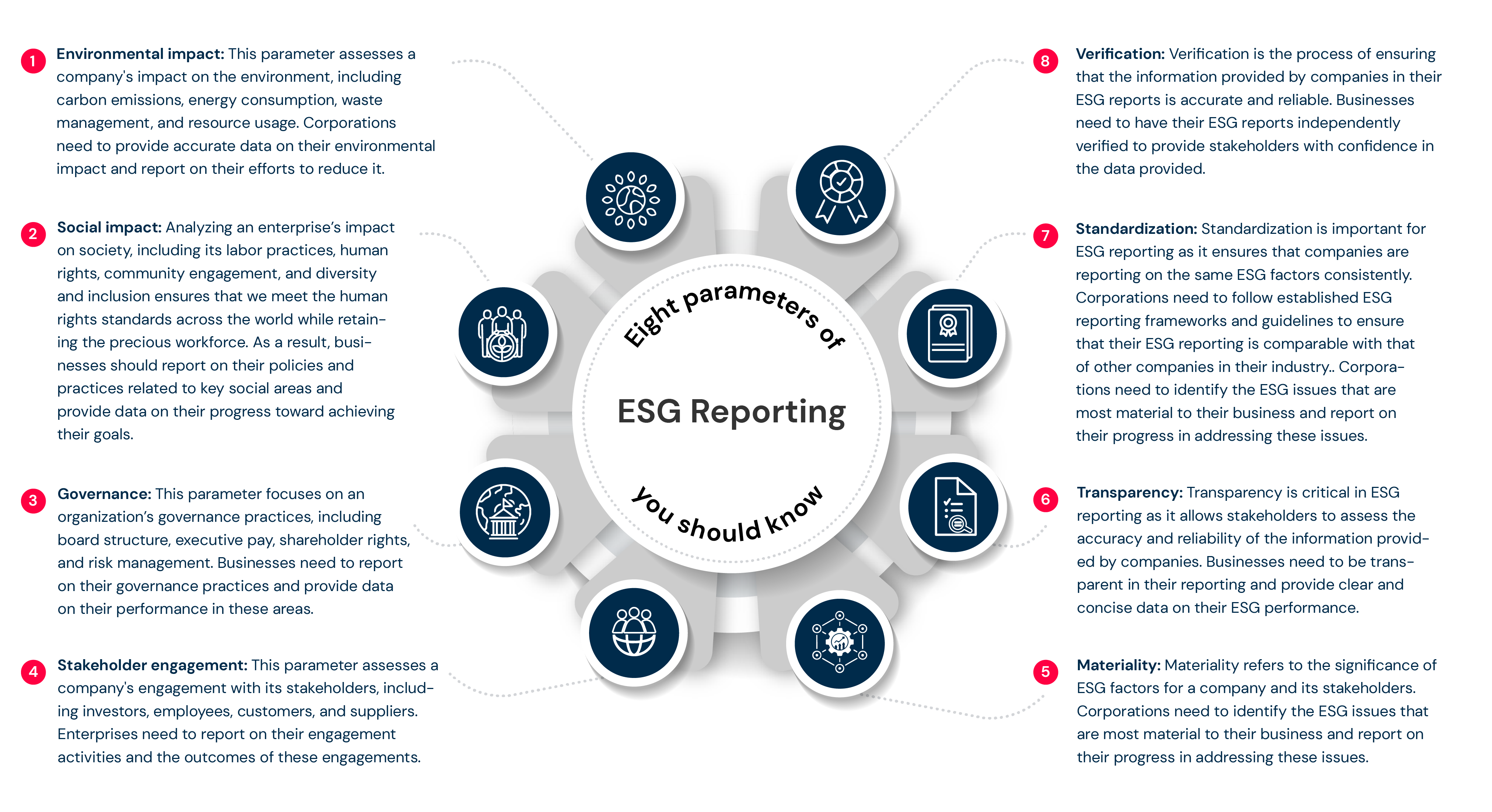ESG (Environmental, Social, and Governance) reporting has gained tremendous significance as investors and stakeholders become more conscious of business impact on the environment, society, and governance. ESG reporting enables provides a comprehensive picture of a company’s sustainability performance and helps in making informed investment decisions.

The eight key parameters of ESG reporting you should know
ESG reporting has gained tremendous significance as investors and stakeholders become more conscious of business impact on the environment, society, and governance. ESG reporting enables provides a comprehensive picture of a company’s sustainability performance and helps in making informed investment decisions.
As we can understand, businesses that conduct ESG reporting garner trust and opportunities. However, enterprises must ensure to consider these eight important parameters while reporting their ESG performance:

Now that we have covered the key parameters for ESG reporting, let us also understand why enterprises should focus on ESG reporting.
Flashing the limelight on ESG reporting: Importance for businesses worldwide
ESG reporting is the process of disclosing information related to a enterprise’s impact on the environment, social well-being, and governance practices. In recent years, the importance of ESG reporting has increased dramatically, driven by a growing awareness of the need for sustainable business practices and increased stakeholder interest in the long-term health of enterprises.
Let us look at the benefits of ESG reporting below:
Communicating the impact
One primary benefit of ESG reporting is that it allows enterprises to communicate their business impact on the environment and society. This information enables investors to access the sustainable viability of any business’s operations and using its present analysis, make future predictions as well.
Identify growth and risks
ESG reporting helps businesses identify opportunities for growth and innovation. For instance, companies that adopt sustainable business practices may have a competitive advantage in attracting investment, customers, and employees who are increasingly interested in environmentally and socially responsible businesses. By disclosing information related to their ESG practices, companies can signal to the market that they are committed to sustainability and demonstrate their progress toward their sustainability goals.
Improve governance practices
When enterprises disclose information regarding their governance practices, they demonstrate their commitment to transparency, accountability, and ethical behavior. This enables them to build trust with stakeholders and increase the credibility of the company.
Drive towards change
ESG reporting help enterprises progress toward a more sustainable future. By publicly disclosing ESG information, companies are held accountable for their impact on the environment and society. This can drive companies to improve their ESG practices, which can in turn drive progress toward a more sustainable future. ESG reporting can also help to inform public policy and regulation, by providing data and insights that can be used to inform decision-making.
Concluding thoughts
In conclusion, ESG reporting is an important tool for companies to communicate the impact they have on the environment and society and to manage their sustainability-related risks and opportunities. By providing a comprehensive view of a company’s ESG practices, ESG reporting can help to build trust with stakeholders, drive progress towards a more sustainable future, and improve governance practices.
As enterprises evolve to meet the ESG standards and frameworks across the world, it has become increasingly important to meet the different requirements. However, using archaic spreadsheets results in overconsumption of effort and time. Then how does enterprises meet the requirements?
The solution is digital, the solution is cloud-technology. Presenting Eka’s Sustainability and ESG reporting solution. A flexible solution that provides comprehensive reports and analysis for businesses to meet their requirements and achieve their net-zero goals.
Other resources

ESG trends and ESG regulations
Net-zero ideals are no longer limited to paperwork as nations across the world are actively extending their resources to meet their carbon-neutral goals.

Sustainability reporting vs ESG reporting. How different are they?
From the onset of the 1980s, sustainability reporting emerged as a scattered concept. But with the arrival of the 2000s, sustainability reporting renewed with vigor.

Net-zero ideals are no longer limited to paperwork as nations across the world are actively extending their resources to meet their carbon-neutral goals.

From the onset of the 1980s, sustainability reporting emerged as a scattered concept. But with the arrival of the 2000s, sustainability reporting renewed with vigor.